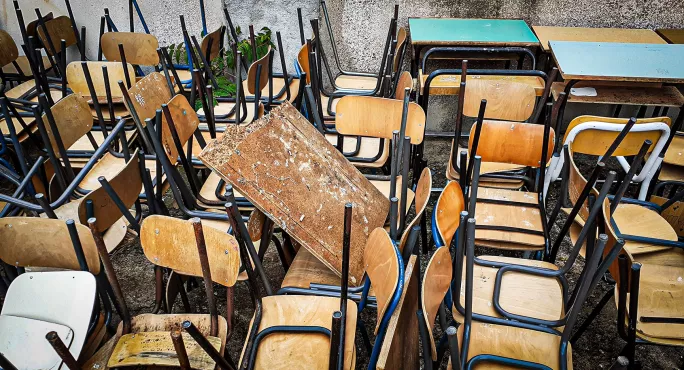
Participation in standardised tests yet to reach pre-Covid levels

Uptake of Scotland’s standardised national tests in reading, writing and numeracy is down compared with before the pandemic at every age and stage, with overall participation sitting at just below 90 per cent last year, according to new Scottish government figures.
In total, 544,6882 Scottish National Standardised Assessments (SNSAs) were completed in the 2022-23 school year, or equivalent to 89.3 per cent of the maximum number possible, according to a new national report on the tests published.
In 2018-19, the overall completion rate was 93.4 per cent, according to the government’s national report published in January 2020.
The biggest dip in uptake compared with the pre-pandemic data was in S3, with the completion rate for the reading, writing and numeracy tests sitting at around 80 per cent last year. In 2018-19 the completion rate in S3 was around 90 per cent.
The completion rate was lowest for the S3 writing test: last year 78.5 per cent of students enrolled to sit the test completed it.
It was highest for the P4 numeracy test: last year 96 per cent of pupils enrolled to sit the test completed it.
Completion rate down on pre-Covid levels
In P1, the completion rate is also still substantially down on 2018-19 levels: that year, 91 per cent of enrolled pupils sat both the literacy and numeracy tests, but by last year those figures were 86.7 per cent and 87.1 per cent respectively.
The figures have prompted Scotland’s largest teaching union to reiterate calls for the tests to be scrapped. The EIS says the SNSAs are of limited use and the millions spent on them would be better spent on teachers and support staff.
- Background: OECD - Replace standardised tests with sample survey
- Latest data: Primary literacy and numeracy achievement ‘highest on record’
- Analysis: P1 testing must focus on development, not the three Rs
However, secondary headteachers’ body School Leaders Scotland (SLS) says if SNSAs are scrapped, schools will simply have to pay for a different testing regime. It wants to see the tests improved so that the data generated is more useful.
The 2022-23 school year was the sixth year of implementation for SNSAs, which are sat by pupils in P1, P4, P7 and S3.
The tests have proven controversial because of the time that has to be invested in them - according to the 2022-23 national report, each test takes pupils 16 to 35 minutes to complete on average - compared with the perceived usefulness of the data.
In its 2021 report on the implementation of Curriculum for Excellence, the Organisation for Economic Cooperation and Development recommended the tests be replaced with “a sample-based evaluation system”.
The fact that children in the first year of primary school sit the tests has also been contentious. A recent survey of primary school leaders found fewer than 30 per cent thought the data generated by the tests was useful in P1.
Today, responding to the latest national report on the tests for the academic year 2022-23, the EIS told Tes Scotland it had long raised concerns about “the very limited utility” of SNSAs and that it would like to see the tests scrapped.
‘High financial and workload cost’
It says computerised tests, such as the SNSAs, come at “a high financial and workload cost” but are “very limited in their ability to assess the wide range of knowledge and skills that children acquire”; teachers continue to report “that the information presented in the learner reports is not detailed enough to offer any additional insights”.
The EIS said: “The millions of pounds that are being spent annually on SNSAs could be much better spent on employing more teachers and support staff to work directly with young people in the classroom to help them make steady progress in their learning.”
SLS, however, stops short of calling for the tests to be scrapped.
SLS general secretary Graham Hutton said that if SNSAs are discontinued, schools will simply have to replace them with paid-for assessments. SNSAs, he added, have the benefit of at least being cost free for schools - although they, of course, cost the Scottish government money.
In January 2022, Tes Scotland revealed that a new contractor had been brought in to run the tests, with the cost to the taxpayer expected to be £17 million over five years.
However - while the tests have the advantage of being free - Mr Hutton said they are “currently seen as challenging to complete” because they are computer-based and heads feel the data generated is not as useful as it could be.
The SNSAs should include “some type of standard age score” so that schools can easily see if students are performing at, above or below the expected level for their age and stage.
Mr Hutton added that they would also be more useful if they “could be used to predict outcomes at N5 level and beyond”.
For the latest Scottish education news, analysis and features delivered directly to your inbox, sign up to Tes magazine’s The Week in Scotland newsletter
You need a Tes subscription to read this article
Subscribe now to read this article and get other subscriber-only content:
- Unlimited access to all Tes magazine content
- Exclusive subscriber-only stories
- Award-winning email newsletters
- Unlimited access to all Tes magazine content
- Exclusive subscriber-only stories
- Award-winning email newsletters
You need a subscription to read this article
Subscribe now to read this article and get other subscriber-only content, including:
- Unlimited access to all Tes magazine content
- Exclusive subscriber-only stories
- Award-winning email newsletters
- Unlimited access to all Tes magazine content
- Exclusive subscriber-only stories
- Award-winning email newsletters
topics in this article



